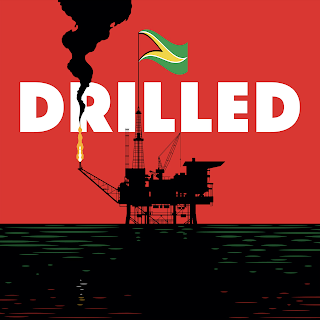The first episode of season eight of Drilled by Amy Westervelt has a long comet's tail of sordid climate history related to oil companies and their decades-long misinformation campaigns.
Projections
created internally by ExxonMobil starting in the late 1970s on the
impact of fossil fuels on climate change were uncannily accurate, even
surpassing those of some academic and governmental scientists, according
to an analysis published in Science
by a team of Harvard-led researchers. Despite those forecasts, the multinational energy giant continued to sow doubt about
the gathering crisis.
“This paper is the first ever systematic
assessment of a fossil fuel company’s climate projections, the first
time we’ve been able to put a number on what they knew,” said Geoffrey
Supran, lead author and former research fellow in the History of Science
at Harvard. “What we found is that between 1977 and 2003, excellent
scientists within Exxon modeled and predicted global warming with,
frankly, shocking skill and accuracy, only for the company to then spend
the next couple of decades denying that very climate science.”
Climate journalist/advocate, Drilled Podcast host and owner of the Critical Frequency podcast network, Amy Westervelt is the perfect person to expose this corporate perfidy and climate crime scene. Westervelt is one of the
most prominent and prolific reporters, revealing spin and lies from oil
companies in articles and several
hit podcasts.
Last year, the producers for the Paramount Plus docuseries Black Gold
knew there's one voice you need to tell any story about "the plot to
trade our planet for profit" by oil tycoons.
That was Amy Westervelt. In her interview on the documentary, Westervelt helps to frame the narrative, explaining in clear, vivid language the misdeeds and machinations of oil companies in facilitating climate change and then covering their tracks.
Drilled, now in its eighth season, is a true-crime style podcast about climate change. David
Wallace Wells of The New York Times called it "eye-opening, gripping,
outrageous."
The first episode is about the small South American nation of Guyana.
Several miles off the coast of Guyana sits one of the world’s largest oil reserves. In 2015, ExxonMobil, which had held offshore drilling leases in the country for decades, announced it had found oil and would begin production as soon as possible. Government officials quickly got in line, and in 2019 the first barrels shipped from ExxonMobil Guyana. Today, Exxon projects that oil from Guyana could account for 25 percent of its total production in the next few years.
A key question in the episode is: Why start an oil industry in the midst of a climate crisis? And especially in a country at great risk of climate impacts? Via a contract that will sooner put Guyana in debt than make it a rich oil state, no less?
In just a few years, Exxon has co-opted both government and civil society, buying up social license in every corner of the country. Oil executives and Guyanese officials are still telling the story that oil equals development and prosperity, and on paper Guyana is the fastest-growing economy in the world, but average citizens aren’t benefiting from the boom.
Today, there’s only one journalist left covering the project with any sort of skepticism, and one lawyer left willing to take it on in court.
Five years ago, Kiana Wilburg was a new reporter when ExxonMobil executives and Guyanese government officials announced they had found oil 40 miles offshore. Wilburg and her newsroom had to quickly learn about the industry and this company that was suddenly so influential in their country, and were left with just one question: exactly what kind of deal had the country signed onto?
Listen to the first episode of season eight of Drilled -- "The Boom" -- Westervelt paints a devastating portrait of how the oil industry not only accelerates climate change but also extracts oil at the cost of a small nation's ability to provide for its people, govern fairly, and offer its citizens a bright future.

Comments
Post a Comment
Thank You for your input and feedback. If you requested a response, we will do so as soon as possible.